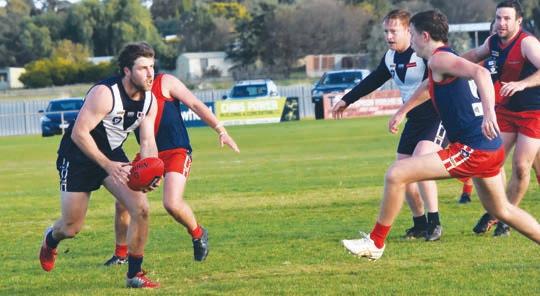
1 minute read
Partnership explores land culture
from Loddon Herald 8 June 2023
by Loddon
CULTURAL burning and women’s digging stick farming practices have been explored in a partnership between Mount-Korong EcoWatch and Dja Dja Wurrung.
Department of Energy, Environment and Climate Action (is supporting the project to build relationship between the groups that was first planned two years ago.
Advertisement
However, COVID followed by last October’s flood emergency delayed a start on the project being led by Djarra women aunty Marilyne Nicholls and Bec Phillips.
Djarra cultural burners and their families also joined Aunty Marilyne and Bec on country for the burn.

Eco-watch shair Sally Gardner was involved from the beginning and said that the delays were actually quite beneficial.
“It gave us time to build trust and to develop and sustain the relationship and commitment to Djarra getting onto the land to heal country,” she said.
The project took place at two properties around Mount Korong.
At one site, the focus was on Djarra women’s digging stick farming lead by aunty Marilyne,
“Under the guidance of Aunty
Marilyne and Bec, we were welcomed onto country and inducted into the cultural and ecological setting of Djarra women’s farming practices,” Sally said.
“Volunteer participants planted kangaroo grasses around the inflow zone of a dam using the extraordinarily well-designed traditional digging sticks.”
A cultural burn took place at the second site on an area of grassland with Aunty Marilyne and Bec and Djarra Cultural Burners with their families. Volunteers from Landcare Networks in the area were also present.
“There was much anticipation within both the Djarra group and amongst the non-Indigenous participants leading up to this event,” Sally said.
“The weather forecast was looking good for the designated day. “There was also a great sense of the potential for this event to have an historic significance, with Djarra women leading the first cultural burn on that part of country in more than 150 years.
“We were not disappointed. It was clear that for Djarra this slow, cool burn, taking place as a peaceful family occasion different from the burns normally undertaken by government agen- cies, was indeed a healing event. Those of us watching from a respectful distance understood our great privilege in being witness to gestures of deep spiritual significance.”
Sally said she hoped that ecowatch could be involved in helping to develop new frameworks of ongoing generational access by Djarra to undertake cultural and healing practices on country.






